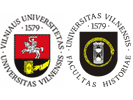Professor Joachim Lelevel worked at Vilnius University between 1815–1818 and 1821–1823. He lectured a course on universal history, that was printed (Wyklad historii powszechnej. t. 1–5). He followed the contemporary French and German historians Antoin Ferrando, Lenglet de Fresnoy, Bartold Georg Niebuhr, and Arnold Heeren, but he was also very original, too. In Vilnius he created an understanding of the historical science of the Englightenment. It was based on the philosophy of the Englightenment and historical documents. The aspiration of humankind for perfection and solidarity was declared an object of historical science. He saw the progress of humankind in education, as man’s ethics and power was dependent upon it. He considered the huiman mind as the main criteria of truth. He thought that each nation had a specific “soul of the nation,” but it was different, depending on the epoch, therefore, history is not to be mechanically divided using dynasties, but into epochs where the previous “soul of the nation” changes, vanishes, and the new “soul of the nation” appears. One has to look after it in the statute, politics, social system, and habits of the people. J. Lelevel pointed out the steps of the evolution of different nations and the variability of their lives. He explained it according to different climater, traditions, and ways of lives of the nations. The full release of creative potentials is possible only with political freedom and freedom of mind. Despotism and slavery limits the progress of society while democracy stimulates it. He formulated an ideology of democracy in the begining of the XIVth century and looked for it in history. J. Lelevel divided universal history into the following epochs: Ancient Orient, Roman and Gruk, and the Middle Ages (VI–XV). He stressed Christianization and feudalization (of different Western and Eastern models), and, in the New Ages (XVI–XIX century), absolutism and revolutions. He compared patterns of national histories. For the first time, the course of universal history included the history of Poland and Lithuania with one work, “Dzieje Litwy i Rusi,” dedicated to the latter. He collected documented materials of Lithuanian history, and they were published under the name of T. Dzialinski, “Zbior prav litevskich.” |


 dizainas ir programavimas giriaus
dizainas ir programavimas giriaus  dizainas ir programavimas giriaus
dizainas ir programavimas giriaus